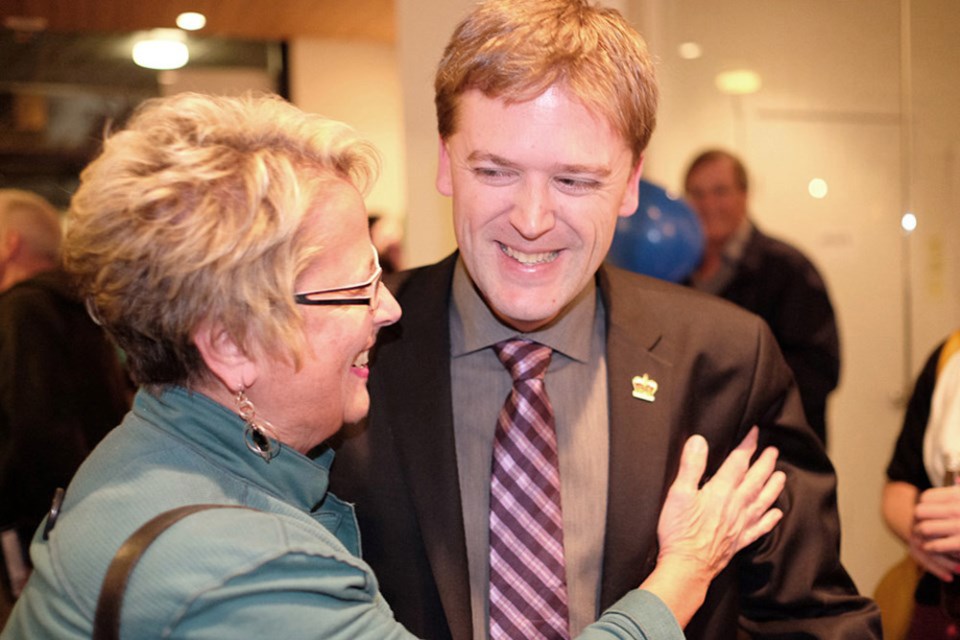Will a competitive three-way mayoral race be the difference-maker for voter turnout in New Westminster’s civic election?
Voters head to the polls Oct. 15 to select a new mayor, city council and school board — and, with multiple incumbents not running again, there's room for some big changes in all three places. But will that motivate New Westminster voters to turn out tomorrow?
That, of course, remains to be seen — though history doesn't suggest it will be so.
Municipal elections in B.C. have historically seen low voter turnout, and New Westminster is no exception: The highest voter turnout the city has seen over the past six elections is 31 per cent.
That was in 2002, when business owner Wayne Wright defeated incumbent Mayor Helen Sparkes in a battle so close it went to a recount. His margin of victory was just 18 votes. The next-highest turnout was in 2014, when Wright — by then a four-term mayor — was defeated by city councillor Jonathan Cote. Just shy of 30 per cent of eligible voters turned out that year, as Cote posted a decisive win: 52.6 per cent of the vote to Wright’s 35 per cent.
Cote, of course, went on to serve as mayor for two terms before deciding not to run again this fall.
His departure paved the way for an interesting mayor’s race this time out, with two incumbent city councillors vying for the chair: Patrick Johnstone, running under the Community First New West banner and with the New Westminster and District Labour Council endorsement; and council veteran and former MLA Chuck Puchmayr, running as an independent against his former teammate from the 2018 election.
Also in the mix is Queensborough lawyer Ken Armstrong, stepping up for the New West Progressives.
The three-way race brings new dynamics into play at the New Westminster polls.
Will labour-endorsed dominance continue in New Westminster?
Could a possible split of the labour/left vote open the door for Armstrong? Could an old guard-versus-newcomer vote play out — and, if it does, who will it favour? Will incumbent name recognition matter — and, if it does, who will benefit more? Will issues that have proven divisive in public discourse — such as policing, homelessness and the state of downtown — prove to be tipping points for one candidate or another?
Those questions will be on many minds as ballot counting begins tomorrow night.
On the city council front, the mayoral bids by Johnstone and Armstrong, combined with the decision by incumbent Mary Trentadue to not run again, leave just three incumbents in the race: Jaimie McEvoy, Chinu Das and Nadine Nakagawa, all with Community First New Westminster. Will the three retain their seats? Will their newcomer Community First teammates (Ruby Campbell, Tasha Henderson and Bereket Kedebe) win seats to continue the dominance of labour-endorsed candidates at city hall? Or will the New West Progressives team — Karima Budhwani, Rick Folka, Daniel Fontaine, Paul Minhas and Jiayi Li-McCarthy — be able to make their breakthrough? How will the one independent in the race, Daniel Ampong, fare against the power of electoral organizations?
The questions are similar on the school board front, where two of the labour-endorsed ruling majority — Mark Gifford and Anita Ansari — have chosen not to run again, and independent Mary Lalji has also stepped away. That leaves four incumbents in the race: Danielle Connelly with the New West Progressives, and Dee Beattie, Gurveen Dhaliwal and Maya Russell of Community First New West.
Newcomers running for Community First New West are Marc Andres, Elliott Slinn and Cheryl Sluis, while the New West Progressives are fielding two newcomers: Kathleen Carlsen and Teo Dobre. The trustee race, too, will test the power of the labour-endorsed, NDP-affiliated Community First candidates against the Progressives' attempt to gain more than their one current seat on the board.
The questions are many. But whether the new dynamics will be sufficient to overcome traditional voter apathy and get people to the polls — well, that remains an open question.
New Westminster voter turnout: The numbers since 2002
2002: Wayne Wright vs. Helen Sparkes
- In a nutshell: Upstart businessman Wayne Wright takes on incumbent mayor Helen Sparkes.
- Result: Wright wins a nail-biter
- Voter turnout: 31 per cent
2005: Wayne Wright vs. Casey Cook
- In a nutshell: Four-term city councillor Casey Cook (an ally of former mayor Helen Sparkes) challenges Wright for the mayor’s chair.
- Result: Wright posts a decisive victory
- Voter turnout: 25.8 per cent
2008: Wayne Wright vs. Blair Armitage
- In a nutshell: The new Voice New Westminster electoral organization forms and mobilizes in an attempt to defeat Wright and the labour-endorsed city council.
- Result: Wright gets 55 per cent of the vote; Armitage 42 per cent
- Voter turnout: 23.6 per cent
2011: Wayne Wright vs. James Crosty (and others)
- In a nutshell: Three challengers step up to take on the Wright juggernaut: James Crosty, Vance McFadyen and François Nantel.
- Result: Wright gets 61.3 per cent of the vote; Crosty 29 per cent
- Voter turnout: 25 per cent
2014: Wayne Wright vs. Jonathan Cote
- In a nutshell: A young city councillor decides to try for the mayor’s chair — and upsets the sitting mayor.
- Result: Cote wins 52.6 per cent of the vote; Wright 35 per cent
- Voter turnout: 29.97 per cent
2018: Jonathan Cote versus three also-rans
- In a nutshell: There are technically four mayoral candidates in the race — but, in practice, it’s as close to a coronation for Cote as you’re likely to see.
- Result: Cote wins 73 per cent of the vote
- Voter turnout: 27.5 per cent
– statistical information courtesy CivicInfoBC (2008 to 2018) and the Record archives
Follow Julie MacLellan on Twitter @juliemaclellan.
Email Julie, jmaclellan@newwestrecord.ca



